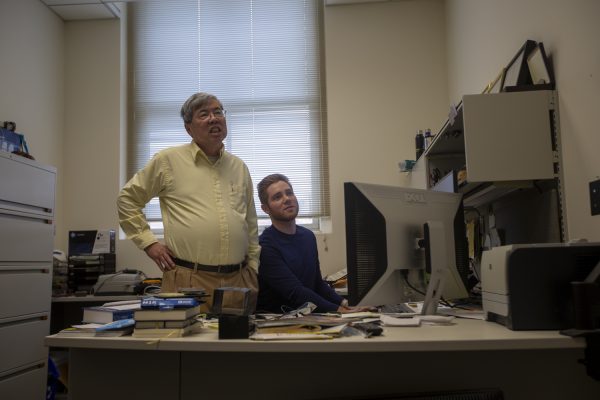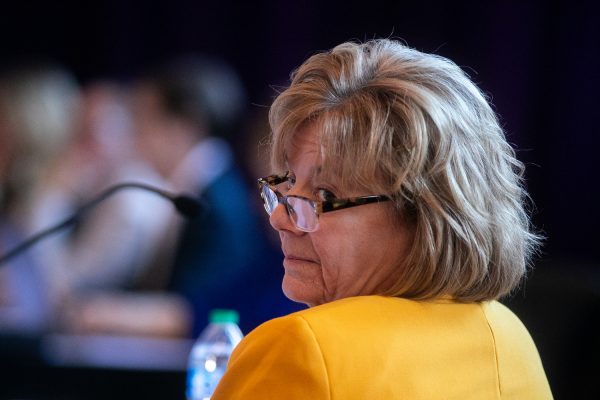State licensing restricts some nonresident students’ access to UI tele-mental health services
University Counseling Service is exploring state law and working with a legal counsel to understand how its tele-mental health resources can be shared with out-of-state students amid the COVID-19 outbreak.
University of Iowa Counseling Services Director Barry Schreier is seen in his office at the Westlawn Building on December 12, 2019. Schreier recently was awarded the Association of University and College Counseling Center’s President’s Award for Meritorious Service in the National Field of Campus Mental Health.
April 1, 2020
Students living outside the state of Iowa may have limited access to tele-mental-health services that the University Counseling Service offers because of state licensing constraints, as UCS’s mental-health providers are licensed to practice in the state of Iowa and not other states.
However, University Counseling Service Director Barry Schreier said the department is diligently exploring other states’ laws in order to determine how it can extend its services to out-of-state students.
“My guess is that eventually we are going to be extending services to students who are living in other states, but we are just not there yet,” Schreier said. “Without any federal guidelines for what is happening right now, [those guidelines] are forming state by state. It all comes down to which state the student is living in.”
The University of Iowa announced March 18 that classes will be online for the rest of the semester, canceled all nonessential events for the spring semester, and closed residence halls to most students. In response to this change, University Counseling Service has transitioned to an online, tele-mental health format to provide one-on-one and group counseling for UI students.
RELATED: UI offers tele-mental health resources with campus closed to contain coronavirus spread
Schreier said certain states have lifted restrictions to allow students living there to receive UI counseling in response to the COVID-19 pandemic. The UI is still hoping for restrictions to be lifted at the federal level during this time of emergency, however, Schreier said.
But there are resources for students to access UCS. There is a support group via Zoom specifically pertaining to COVID-19 from 1-2 p.m. Wednesdays and a Mindfulness Matters workshop via Zoom from 1:30-2 p.m. Thursdays.
UI second-year student Molly Lecher, a human physiology major from Wisconsin, said in an email to The Daily Iowan that it’s unfortunate that some out-of-state students cannot receive counseling from University Counseling Service during this time.
“Having these resources for free is a really great way to make getting counseling easy for those who maybe aren’t sure about it at first or who wouldn’t know how to get them otherwise,” Lecher said. “It’s not great that out-of-state students are not able to have these resources.”
UI Student Health Interim Director and psychiatrist Paul Natvig said his office is facing fewer restrictions than UCS to work with out-of-state students who may be struggling with cases of anxiety or depression. Student Health can continue services for current patients.
“If we already have an established relationship with them — we have already done the history and we have all the records for them — then we could continue to manage their treatment by telephone,” Natvig said. “If you are not an established patient, then we would not be able to do that.”
RELATED: UI classes will move online, for rest of semester, spring commencement canceled
Natvig said any UI student, whether established or not, should call Student Health or UCS to let them help students in whatever situation they’re in.
“As physicians, primarily what [Student Health] is doing is, if it is a mental-health issue, then someone is on a medication,” Natvig said. “We would be limited if we didn’t have an established relationship with them, but we would still help them sort out local resources.”
While out-of-state students in many areas are not able to receive one-on-one counseling, UCS still encourages them to take advantage of the clinical workshops and support groups that are listed on its website.
“Students can call us for case-management services, and we also currently have a ‘coping with COVID’ support group that students can use as much as they want,” Schreier said.
Schreier said more resources are available daily on the UCS social-media accounts. He added that this is a situation that will likely change over time as states continue to lift restrictions.
“The University Counseling Service is open for business,” Schreier said. “If a student is away, they should still call and let us guide them towards the best options available.”














